Faculty and residents from the University of Wisconsin Department of Radiology championed the importance of radiology research and patient care to state and federal officials. Through various efforts, faculty members Oliver Wieben, PhD; Robert Bour, MD; Jade Anderson, MD; Pallavi Tiwari, PhD; Anand Narayan, MD, PhD; and Mai Elezaby, MD shared their professional insights with government representatives and the public in pursuit of funding and legislation that will help launch careers and save lives.
Residents Erik Winterholler, MD and Erin Sullivan, MD also engaged in efforts to establish dialogue with government leaders. Department alumni, including former Musculoskeletal Imaging & Intervention fellow and resident Karla Wetley, MD; and former Breast Imaging & Intervention fellow and resident Jennifer Bergin, MD supported their fellow Badgers in these pursuits.
Dr. Wieben traveled to Washington, DC to discuss the importance of science and research funding. In a separate visit to our nation’s capital, Drs. Anderson, Bour, Winterholler, Sullivan and Wetley met with U.S. Rep. Mark Pocan.
Closer to home, Dr. Tiwari gave a presentation on the use of AI in health care research as part of UW–Madison Day at the Capitol. Dr. Narayan testified for a state bill that would provide coverage for diagnostic breast exams for women with dense breast tissue or at increased risk for breast cancer.
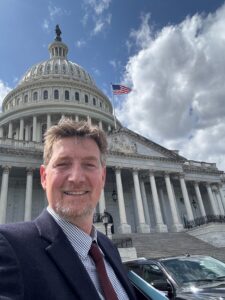
Dr. Wieben goes to Washington
On the afternoon of March 31, 2025, Dr. Wieben and Sundaram Gunasekaran, PhD, from the Department of Biological Systems Engineering, met with staff members from the offices of U.S. Sens. Tammy Baldwin and Ron Johnson, and Rep. Pocan advocating for the support of science and research funding. The American Institute for Medical and Biological Engineering (AIMBE) and the university coordinated the meetings.
“The recent significant delays in study section and council meetings and distribution of funds to already approved grants, including noncompetitive renewals, have put an unnecessary burden on the progress of science,” said Dr. Wieben. “Our Medical Physics program admitted only half as many PhD students as usual because of the uncertainties in funding. These disruptions will result in further amplifying the shortage of board certified medical physicists and impact the career decisions of young scientists in possibly not pursuing graduate school or leaving academia given the unpredictable job market.”
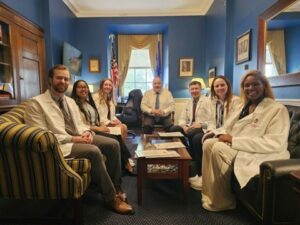
American College of Radiology’s Capitol Hill Day
On May 7, 2025, department faculty, trainees and alumni met with Pocan as part of the American College of Radiology’s Capitol Hill Day. The meeting was scheduled with Representative Pocan’s office through the Wisconsin Radiological Society.
“Typically, we meet with office staffers on these types of visits,” explained Dr. Winterholler. “But Rep. Pocan made time to meet with us personally.”
Faculty members Dr. Bour and Dr. Anderson joined Dr. Winterholler, along with resident Dr. Sullivan, alum Dr. Wetley and Srijyotsna (Lucky) Volety, MS, a PhD student in the Department of Medical Physics. The group raised awareness of the Radiology Outpatient Ordering Transmission (ROOT) Act, which would promote value-based care, help patients avoid unwarranted imaging and radiation exposure, and reduce Medicare spending on low-value imaging.
While Pocan stated that action is challenging in the current legislative environment, he also expressed concern for Wisconsinites, including physicians.
“He took time to listen and understand the radiologists’ perspective and responded to our concerns with genuine interest,” said Dr. Winterholler.
Dr. Tiwari presents at UW–Madison Day at the Capitol
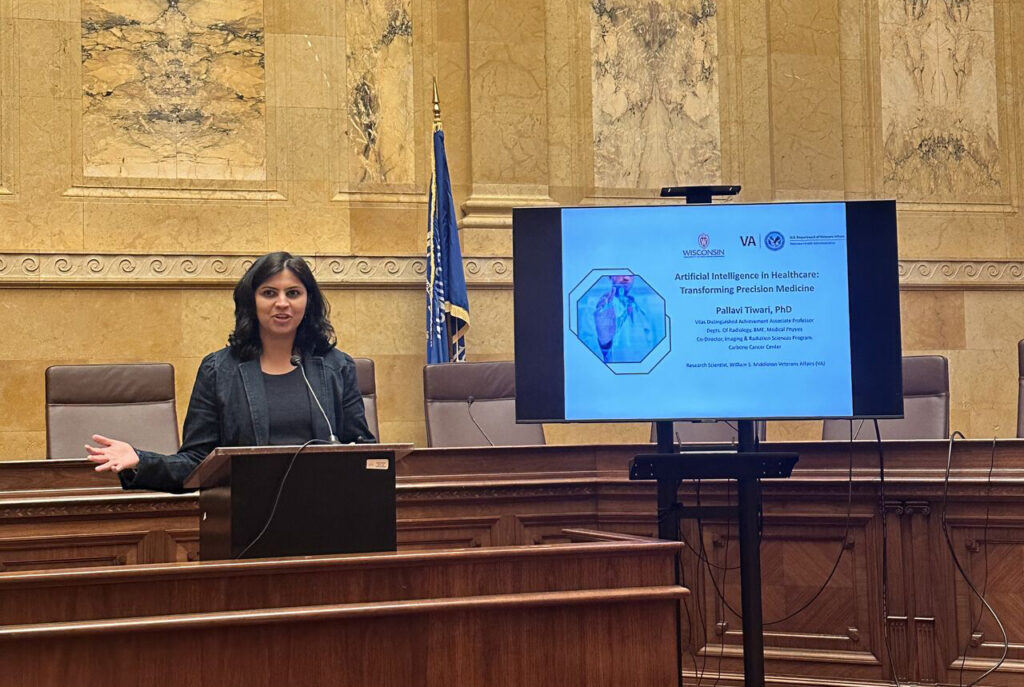
On April 30, 2025, UW–Madison Day at the Capitol provided the public an opportunity to see the highlights of the university’s faculty, students, alumni and athletics. The Faculty Flash Talks, a feature of the event, are brief showcases of leading research from UW faculty, educating the public on how state-funded projects can benefit society.
For her Faculty Flash Talk, Dr. Tiwari presented her research on the use of AI in medical imaging, which she leads as part of the Integrated Diagnostics and Analytics (IDiA) Laboratory for Precision Medicine efforts. Dr. Tiwari encouraged others to be open to the use of AI in health care.
“There is the potential for AI applications in health care to make diagnoses more efficient and reliable,” said Dr. Tiwari. “This can result in people seeing positive benefits by saving money on their health care and having better patient outcomes.”
Dr. Tiwari believes RISE-AI, part of the Wisconsin Research, Innovation and Scholarly Excellence (RISE) Initiative, is a step forward, adding more faculty to focus on developing and refining AI technology. However, it may not be enough to reach the goal of improving AI for health care applications.
“More work and support is needed,” said Dr. Tiwari.
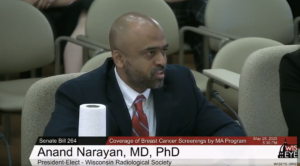
Dr. Narayan advocates for breast cancer screening coverage
On May 28, 2025, Dr. Narayan testified on behalf of the Wisconsin Radiologic Society at a Wisconsin State Senate hearing in support of Senate Bill 264. Dr. Elezaby, the chief of the Section of Breast Imaging and Intervention, also attended the hearing.
If this legislation passes, Wisconsin would join several other states requiring health insurance policies to cover diagnostic examinations and supplemental screenings for individuals with increased risk of breast cancer or extremely dense breast tissue.
Dr. Narayan testified that the cost of these life-saving examinations is often a barrier for most women.
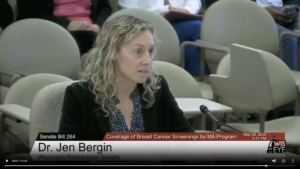
“Unlike screening mammograms, which are covered by law without copays or deductibles, diagnostic exams can cost a lot of money, even if women have health insurance,” said Dr. Narayan. “This often leaves women with a terrible choice: either pay hundreds or thousands of dollars out of pocket to pursue a test their doctors have recommended for them. Or skip the test and hope for the best.”
On June 2, 2025, the Wisconsin Senate Health Committee voted unanimously (5-0) to move Senate Bill 264 to the Wisconsin Senate floor, taking a step closer to becoming a law.
“I’m excited that the bill has moved forward,” said Dr. Narayan. “Passing this bill is an important step to ensure that women all over Wisconsin get access to our best tools to find breast cancer early,”